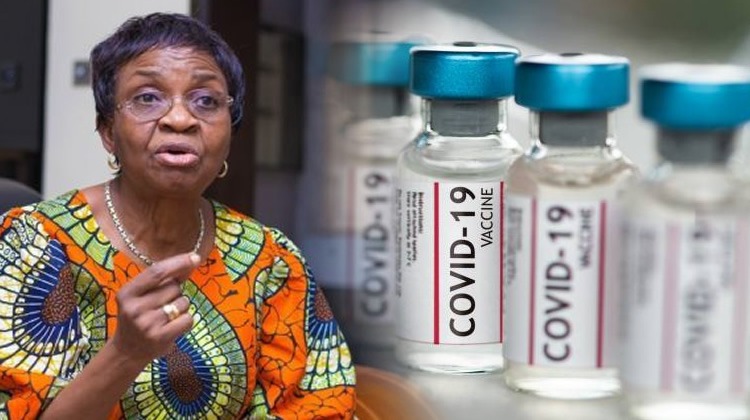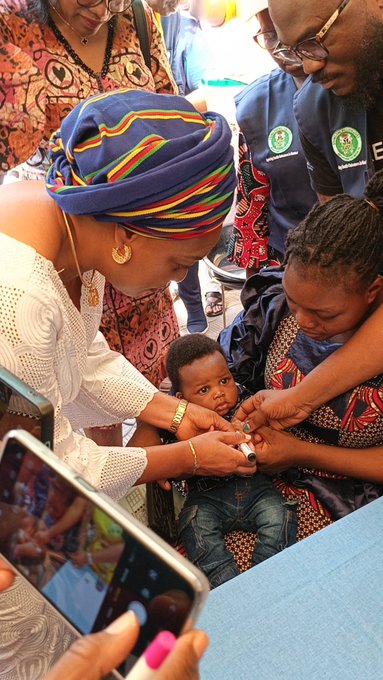Health
COVID-19 Vaccine: NAFDAC, Experts Disagree Over Clinical Trial

The National Agency for Food and Drug Administration and Control (NAFDAC) and some virologists and infectious disease experts have disagreed over conducting a local clinical trial for the proposed N400bn COVID-19 vaccines before administering them on Nigerians.
A clinical trial, according to the WHO, is a type of research that studies new tests and treatments and evaluates their effects on human health outcomes.
While NAFDAC has ruled out the possibility of conducting a local clinical trial of the vaccine, virologists and infectious disease experts are insisting that there is a need to conduct a clinical trial on the vaccines in the country before administering it on Nigerians.
The agency said since the World Health Organisation (WHO( had approved the vaccines there might not be need to conduct another clinical trial on the vaccines.
Speaking on the vaccines, NAFDAC’s Media Consultant, Sayo Akintola, said that owing to the exigencies of COVID-19, there may be no reason to conduct a trial before administering the vaccines.
“Once the vaccine arrives, a sample will be taken to the lab for a test. Once its safety and efficacy are certified by NAFDAC, it will be administered on Nigerians. We don’t expect anything to be different though.
“The truth is that once a vaccine is approved by the WHO, it is assumed that it has passed through some preliminary stage of the trial. It is a known fact that for the WHO to sanction a vaccine, it must have gone through a series of trial here and there,” he said.
Although he said NAFDAC’s evaluation of the vaccine would not be rigorous mainly because it’s not a new vaccine, Akintola noted that its efficacy and safety needed to be ratified.
He stated, “It is just for ratification. There is nothing on drugs or vaccines you will do without the consent of WHO. It is also expected that the regulatory body in each country would do its work in tandem with the WHO standard.”
However, a medical virologist at the Adeleke University, Ede, Osun State, Dr Elijah Kolawole, said it would be safer to conduct a mini clinical trial to determine the efficacy of the vaccine before rushing to administer it on a population of over 206 million.
He said, “This is because there is no evidence to show the earlier trial conducted in Europe had African volunteers. There is something we need to understand. In terms of human genetics, African-Americans are different and cannot be used to represent Africans in a trial.
“They could be similar but they cannot be regarded as a proper representation of Africans. That’s why you see a lot of differences in the way we respond to treatments based on our genetic make-up.”
On his part, a medical microbiologist at the Lagos State University, Prof Bola Oyefolu, said there was the need to conduct a clinical trial before administering the vaccines on Nigerians.
“Before any vaccine is given, there is a standard procedure for it. Before you can inject people with any vaccine, it must have gone through serious clinical trials, and when you look at the duration for that, it will take an average of three years.
“The clinical trial will prevent mortality; there is the need for more time to do a more open clinical trial to be sure that what we are giving to the people is safe.”
He also cautioned the Federal Government against procuring COVID-19 vaccines from abroad.
He said, “From the virological point of view, I don’t think Nigeria should go for the vaccines because everything is shrouded; it is not open. I’m just wondering why they are not doing clinical trials with their own people over there? Why must it be Africans? Are we guinea pigs? Unfortunately, most African leaders won’t look into the core of it; they will just go for the vaccines, maybe for the monetary gain.”
He added, “Once this vaccine is administered and it gives us a negative result, it can’t be reversed and that will be an indictment on the scientists in Africa.”
Health
LASG FLags Off Polio Outbreak Response Campaign

The Lagos State Government, through the Lagos State Primary Health Care Board, has launched the 2025 Polio Outbreak Response Campaign, reaffirming its commitment to eradicating polio and safeguarding the health of its children.
The ceremony, held at the Simpson Primary Healthcare Centre, was led by the First Lady of Lagos State, Dr. (Mrs.) Claudiana Ibijoke Sanwo-Olu, represented by Mrs. Widad Jumoke Mustafa, a member of the Committee of Wives of Lagos State Officials (COWLSO).
In her address, the First Lady emphasised the state government’s proactive measures to keep Lagos polio-free, highlighting the critical importance of the campaign in preventing the debilitating effects of poliomyelitis, which can result in paralysis or death.
READ ALSO: IMPEACHMENT: Lagos Ex-Speaker, Obasa’s ‘Sins’ Revealed
The First Lady also called on parents, community leaders, and stakeholders to support the campaign by ensuring eligible children are vaccinated.
Targeting children aged 0-59 months, vaccination teams will administer the Oral Polio Vaccine (OPV) to prevent virus transmission.
Dr. Kemi Ogunyemi, the Special Adviser on Health, expressed gratitude to Lagosians for their continued cooperation in the fight against polio. While appreciating all healthcare workers and partners for their services, Mrs. Ogunyemi encouraged parents to present their children and wards for the exercise.
Also speaking, the Chairman of Lagos Mainland Local Government, Mrs. Omolola Rashidat Essien opined that Immunization is key in ensuring that children are kept safe from polio and other vaccine preventable diseases.
Dr. Abimbola Bowale, the Supervising Permanent Secretary, Lagos State Primary Health Care Board, who also spoke at the event, underscored the life-saving importance of immunization.
“All children aged 0-59 months need multiple doses of the polio vaccine to ensure full protection. Any child missed represents a potential risk for the poliovirus to spread. The vaccine is safe, effective, and crucial in keeping our communities polio-free,” he stated.
Dr. Bowale also outlined several strategies to ensure the success of the campaign, including fixed post teams stationed at primary healthcare centres and public health facilities, house-to-house visits, and a transit strategy to reach special locations such as places of worship, schools, motor parks, and other public venues.
The event concluded with Dr. (Mrs.) Claudiana Ibijoke Sanwo-Olu officially launched the campaign, marking a renewed effort to maintain Lagos State’s polio-free status.
Headline
Lagos Cholera Cases Rise To 421

The Lagos state suspected cholera cases have risen to 421.
The Commissioner for Health, Akin Abayomi disclosed this on his Instagram handle @profakinabayomi on Saturday.
“As of June 20, 2024, an additional four suspected cholera cases have been reported, as illustrated in the accompanying graph,” he wrote.
He noted that the Emergency Operations Centre in collaboration with all relevant partners is actively engaged in contact tracing, community-based surveillance, awareness campaigns, sample testing, and ensuring that confirmed cholera cases receive appropriate medical treatment.
READ ALSO: Two Suspects Arrested For Stealing Car From Mosque During Juma’at Prayer
On Friday, the commissioner confirmed 35 cases out of the 417 suspected cases and 24 deaths across 20 Local Government Areas in the state.
The cases were reported from Agege, Badagry, Ikeja, Mushin, Ajeromi-Ifelofun, Epe, Ikorodu, Ojo, Alimosho, and Eti-Osa.
Others were Kosofe, Oshodi-Isolo, Amuwo-Odofin, Ibeju-Lekki, Lagos Island, Shomolu, Apapa, Ifako-Ijaiye, Lagos mainland, and Surulere.
Cholera is a food and water-borne disease caused by ingesting the bacteria— Vibrio cholerae — in contaminated water and food. Cholera can cause severe acute watery diarrhoea, and the severe forms of the disease can kill within hours if left untreated.
In Nigeria, cholera is an endemic and seasonal disease, occurring annually mostly during the rainy season and more frequently in areas with poor sanitation.
READ ALSO: Police Arrest 28yr Old Suspected Cultists, Recover Gun In Delta Community
The World Health Organisation on Thursday announced a spike in cholera in several regions of the world, with almost 195,000 cases and over 1,900 deaths reported in 24 countries since the start of 2024.
WHO said the Eastern Mediterranean Region reported the highest number of cases, followed by the African Region, the Region of the Americas, the Southeast Asia Region, and the European Region.
The global health body, however, noted that there are no reported cases in the Western Region, according to its bulletin released on Wednesday.
It said it exhausted its global stockpile of Oral Cholera Vaccines by March but was able to exceed “the emergency target of five million doses in early June for the first time in 2024.”
Health
AUTISM: What You Need To Know

By Silver Yeibake
Autism, commonly known as Autism Spectrum Disorder (ASD), is a neurodevelopmental disorder that affects communication, social interaction, and behavior. Autism is referred to as a spectrum condition since it can manifest in a variety of symptoms and abilities. While the actual cause of autism is unknown, evidence suggests that genetic and environmental factors interact to influence its development.
The risk factors include a sibling with autism, advanced age of parents, exposure to certain air pollutants and pesticides before birth, extreme prematurity, mothers with diabetes, immune system disorders or obesity, any difficulty with delivery leading to deprivation of oxygen to the baby’s brain, fever during pregnancy, lack of certain vitamins minerals during pregnancy, and certain genetic conditions, such as Down, fragile X, and Rett syndromes.
“Risk factors can not on their own cause a disease. However, they can increase the likelihood of that disease in a person.”
It is important to know that contrary to trending claims online, there is no scientific or medical evidence that vaccines or consumption of sugar are risk factors for autism.
READ ALSO: Kidney Stones: What You Need To Know
Autism is defined by difficulties in social interaction and communication. Individuals with autism may struggle to grasp social cues, maintain eye contact, and engage in typical back-and-forth conversations. Some people may also engage in meaningless, repetitive actions, such as hand-flapping or rocking, and have strong interests in specific areas.
It is essential to remember that autism is a lifelong diagnosis, but with early intervention and adequate care, people with autism can live fulfilling lives.
Autism treatment frequently includes behavioral therapy, speech therapy, occupational therapy, and social skills training. Each individual with autism is unique, thus interventions should be tailored to meet their personal needs and strengths.
In spite of the difficulties that autism can cause, many people with autism possess unique talents and abilities. Some people may succeed in fields such as music, art, mathematics, or programming, thus it is important for society to acknowledge and honor the qualities and achievements of people with autism.
In summary, autism is a complicated and diverse disorder that affects individuals in various ways. By raising autism knowledge, understanding, and acceptance, we can build a more inclusive society in which people with autism can thrive and attain their full potential.
Dr. Yeibake, Weriwoyingipre Silver.
Senior Registrar,
Faculty Of Pediatrics,
WACP

 News2 days ago
News2 days agoWhat I Saw After A Lady Undressed Herself — Pastor Adeboye

 Headline2 days ago
Headline2 days agoPROPHECY: Primate Ayodele Reveals Trump’s Plot Against Tinubu

 Metro2 days ago
Metro2 days agoArmed Robbers Shot PoS Operator To Death In Edo

 Politics2 days ago
Politics2 days agoWhy Kano Governor Postponed Formal Defection To APC

 Metro1 day ago
Metro1 day agoAAU Disowns Students Over Protest

 Metro2 days ago
Metro2 days agoJoint Task Force Kills 23 Bandits Fleeing Kano After Attacks

 Metro1 day ago
Metro1 day agoEdo: Suspected Kidnappers Kill Victim, Hold On To Elder Brother

 Entertainment2 days ago
Entertainment2 days agoAnthony Joshua Returns To UK In Private Jet

 Metro2 days ago
Metro2 days agoGunmen Demand N200m Ransom For Kidnapped Brothers In Edo

 Entertainment2 days ago
Entertainment2 days agoPHOTOS: Anthony Joshua Makes First Social Media Post After Surviving Deadly Car Crash
























